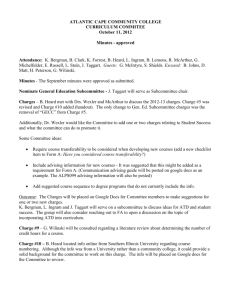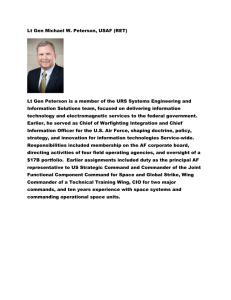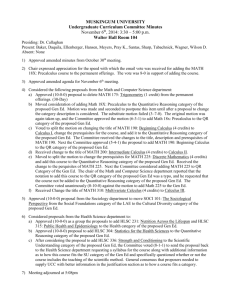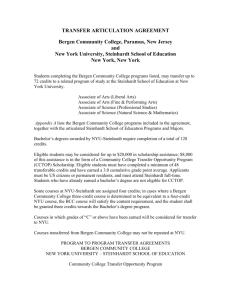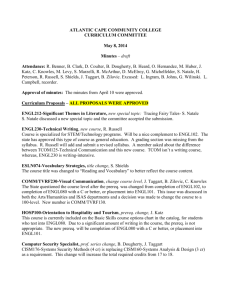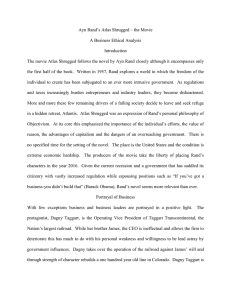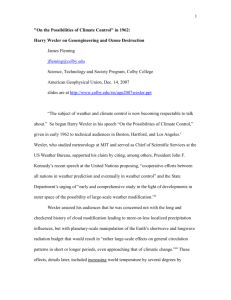May 2011 - Atlantic Cape Community College
advertisement
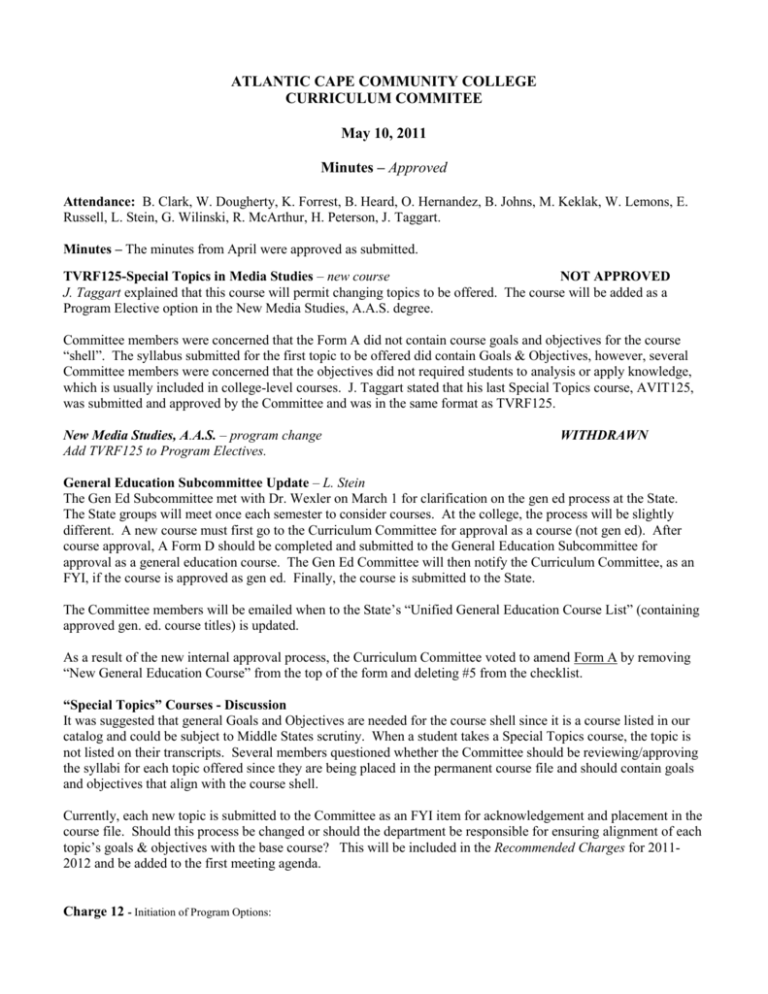
ATLANTIC CAPE COMMUNITY COLLEGE CURRICULUM COMMITEE May 10, 2011 Minutes – Approved Attendance: B. Clark, W. Dougherty, K. Forrest, B. Heard, O. Hernandez, B. Johns, M. Keklak, W. Lemons, E. Russell, L. Stein, G. Wilinski, R. McArthur, H. Peterson, J. Taggart. Minutes – The minutes from April were approved as submitted. TVRF125-Special Topics in Media Studies – new course NOT APPROVED J. Taggart explained that this course will permit changing topics to be offered. The course will be added as a Program Elective option in the New Media Studies, A.A.S. degree. Committee members were concerned that the Form A did not contain course goals and objectives for the course “shell”. The syllabus submitted for the first topic to be offered did contain Goals & Objectives, however, several Committee members were concerned that the objectives did not required students to analysis or apply knowledge, which is usually included in college-level courses. J. Taggart stated that his last Special Topics course, AVIT125, was submitted and approved by the Committee and was in the same format as TVRF125. New Media Studies, A.A.S. – program change Add TVRF125 to Program Electives. WITHDRAWN General Education Subcommittee Update – L. Stein The Gen Ed Subcommittee met with Dr. Wexler on March 1 for clarification on the gen ed process at the State. The State groups will meet once each semester to consider courses. At the college, the process will be slightly different. A new course must first go to the Curriculum Committee for approval as a course (not gen ed). After course approval, A Form D should be completed and submitted to the General Education Subcommittee for approval as a general education course. The Gen Ed Committee will then notify the Curriculum Committee, as an FYI, if the course is approved as gen ed. Finally, the course is submitted to the State. The Committee members will be emailed when to the State’s “Unified General Education Course List” (containing approved gen. ed. course titles) is updated. As a result of the new internal approval process, the Curriculum Committee voted to amend Form A by removing “New General Education Course” from the top of the form and deleting #5 from the checklist. “Special Topics” Courses - Discussion It was suggested that general Goals and Objectives are needed for the course shell since it is a course listed in our catalog and could be subject to Middle States scrutiny. When a student takes a Special Topics course, the topic is not listed on their transcripts. Several members questioned whether the Committee should be reviewing/approving the syllabi for each topic offered since they are being placed in the permanent course file and should contain goals and objectives that align with the course shell. Currently, each new topic is submitted to the Committee as an FYI item for acknowledgement and placement in the course file. Should this process be changed or should the department be responsible for ensuring alignment of each topic’s goals & objectives with the base course? This will be included in the Recommended Charges for 20112012 and be added to the first meeting agenda. Charge 12 - Initiation of Program Options: The NJ President’s Council’s Academic Issues Committee Manual (2010-2011) states, “If an institution decides to introduce a new program option, that action will be formally accomplished pursuant to the process in place at the institution for the approval of options.” “Note to Community Colleges: Options to Associate degree programs shall not differ by more than 18 credits from the base program. Normally, options should differ from the base program by at least 12 credits, but an option that differs by 9 credits may be acceptable if it demonstrates a clear change in program emphasis. Currently Atlantic Cape’s process is that a dept. presents a transmittal to the Curriculum Committee. If approved, by the Vice President, the transmittal and a Board Resolution are presented to the Board of Trustees for their approval. Should we state by how many credits options should differ from their base program? Is our process adequate? Jim Taggart explained to the Committee that this charge was created several years ago when he was chair. The reason for the charge was concern that some of the “base programs” for our options, cannot actually be earned by students. The Liberal Arts degree was corrected several years ago and is now an earnable degree, however, several other base programs, for example, Science and Mathematics, cannot be earned. The Committee and/or associated departments should consider addressing these Base programs. The Committee voted to accept and follow the AIC’s guidelines, but will seek clarification from Dr. Wexler regarding the charge and change the wording, as needed. Work on Charge 11 - Continue to review the definition and criteria for independent study and special topics courses and revise, if necessary. B. Dougherty will seek clarification from A. Wexler regarding this charge as little history is available. Recommended Charges for 2011-2012 This year, the Committee defined various electives (charge #9) by listing the alphas which are currently accepted in each elective category. A suggested charge (to replace charge #13): Identify the criteria for future liberal arts courses and a review of the courses currently classified as liberal arts. At the April meeting, there was a discussion regarding the college’s policy/process for assigning credit hours to new courses. Suggested charge: Examine the criteria/method for determining the number of credit hours assigned to courses. What constitutes a credit hour? Is this the responsibility of the Curriculum Committee or departments? A member of the Committee suggested that the Committee explore a method for notifying students (in the catalog) about courses that may not transfer to upper-level institutions. It was mentioned that NJTransfer was developed for this purpose, however, some students are not aware of this online resource and assume that they’re completing the first two years of a bachelor degree program. State Legislation requires 4-year state college to accept credits from students with community college degrees, however, some upper-level college’s are not honoring this agreement, or have found loopholes. Departments can develop and maintain articulation agreements to help safeguard r articulation agreements with the four-year schools. At the end of the agreement period, either college may decide to discontinue the agreement, as Stockton recently did with our education courses. The Social Science department is currently working with Rutgers-Camden to develop a new education articulation agreement which will give our students another transfer option.


